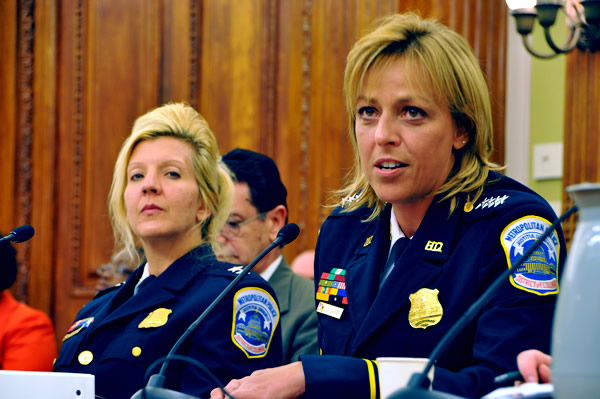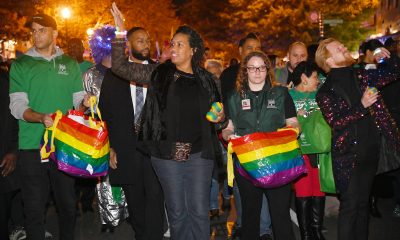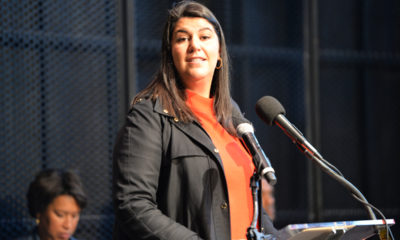Local
Police chief defends fight against anti-LGBT hate crimes
Lanier disputes claim that gay liaison unit ‘dying on vine’

D.C. Police Chief Cathy Lanier told a D.C. Council hearing on Wednesday that the department was making progress in its fight against hate crimes and strongly disputed criticism by the head of the police union that the Gay and Lesbian Liaison Unit was “dying on the vine.”
Her testimony before the Council’s Committee on the Judiciary came after several other witnesses, including D.C. police union chair Kristopher Baumann and LGBT activists, expressed concern that she had seriously weakened the GLLU’s central office, which had once led efforts to fight anti-LGBT hate crimes.
Lanier said some critics have misconstrued her efforts to decentralize and expand the GLLU and the department’s other special liaison units as an effort to discontinue or cut back on the units’ central offices.
“This expansion has not only improved our response to these communities throughout the city, by providing service 24 hours a day, seven days a week,” she said. “But it has also improved our ability to provide consistent information to these communities, while ensuring that information about their needs is integrated into services in each patrol district.”
D.C. Council member Phil Mendelson (D-At-Large), who chairs the committee, said he called the hearing to assess the extent of the city’s hate crimes problem and efforts by the police to address the problem. Other Council members participating in the hearing included Jim Graham (D-Ward 1), Mary Cheh (D-Ward 3) and Muriel Bowser (D-Ward 4).
Graham said he agreed with activists that the GLLU as a whole has been diminished over the past several years. He praised Lanier for doing overall excellent work in fighting crime throughout the city but said she appears to be making changes at the GLLU without “true engagement” from the community the unit is supposed to represent.
“I feel this is slipping away,” Graham said. “It’s a serious loss … This is the message we’re getting.”
Lanier said she could have reached out more to the community on a few issues, including her decision earlier this year to name a civilian administrator as head of the Special Liaison Division, which oversees the GLLU and liaison units working with the Latino, Asian and deaf and hard of hearing communities. But she said members of the GLLU have joined her in expressing disappointment in claims by critics that the unit is not doing as good a job as it has in the past.
Police statistics have shown that D.C. has the nation’s highest rate of anti-LGBT hate crimes, with anti-LGBT bias related crimes making up as much as 70 percent of the city’s overall hate crimes.
Lanier acknowledged that the number of reported hate crimes against the LGBT community has increased significantly in recent years. However, she said it could not be determined whether the actual number of such crimes has increased or whether the increase is due to more people coming forward to report such crimes.
According to D.C. police statistics, in 2010, the total number of reported hate crimes in the city was 68. Out of that total, 35 were crimes targeting gays, lesbians or bisexuals and 10 targeting members of the transgender community.
In 2009, a total of 41 hate crimes were reported, with 30 said to be against gays, lesbians or bisexuals and five based on the victim’s gender identity or expression.
A total of 39 hate crimes were reported in the city in 2008, with 26 said to be against gays, lesbians, or bisexuals and four against transgender persons.
As of June 30 of this year, there were a total of 38 reported hate crimes, according to police data released this week. Out of that total, 14 were based on the victim’s sexual orientation and two were based on the victim’s gender identity or expression.
“It is important to note that because the number of these crimes is relatively low, small shifts in numbers can look disproportionately large in percentages,” Lanier said in her testimony. “Therefore those percentages should be interpreted carefully while also considering the raw numbers.”

A.J. Singletary, president of the D.C. group Gays and Lesbians Opposing Violence, told the committee that Lanier and the department have taken some “laudatory measures” in recent years to combat hate crimes targeting the LGBT community.
But he said the department overall was not properly training officers to recognize and take reports on incidents of anti-LGBT bias that don’t involve a crime of violence but that could lead to violence.
“First, MPD is not documenting anti-LGBT bias incidents effectively, thereby endangering the community and impacting the use of vital resources to prevent hate crimes,” he said.
“Hate incidents – slurs, derogatory terms, or other similar actions – can be tracked and used to target areas of increasing problems across the city,” he told the committee. “We have anecdotal evidence of a disturbing increase in anti-LGBT incidents, including threats, harassment and intimidation.”
Singletary and other witnesses noted that police officials have encouraged citizens to report such incidents to police so that data can be compiled to monitor areas where hate crimes might surface.
“Despite this, GLOV is aware of numerous instances when MPD officers refused to take reports when called and even made the individual feel silly or petty for requesting that the incident be reported,” Singletary said.
Jason Terry, an official with the D.C. Trans Coalition, told the committee that many in the local transgender community lost confidence in police following a December 2010 incident in which an off-duty D.C. police officer assaulted a transgender woman on a downtown street. The woman, Chloe Moore, has accused the officer of assaulting her after she approached him to ask for a light for her cigarette.
The department’s Internal Affairs Division is currently investigating the incident.
Terry and D.C. transgender activist Jeri Hughes told the committee that police officers often assume incorrectly that transgender women, who report being harassed or assaulted because of their gender identity, are prostitutes.
GLOV members and other LGBT activists have complained that Lanier’s decision in 2009 to decentralize the GLLU by assigning affiliate members to the unit from each of the department’s seven police districts diminished the effectiveness of the unit’s central office, which is located in Dupont Circle.
At the time former Mayor Adrian Fenty appointed Lanier as police chief in 2009, there were seven to eight full-time GLLU officers assigned to the central office. The office, created by former Police Chief Charles Ramsey in 2000, became an internationally recognized police entity aimed at addressing issues involving the LGBT community.
Among other things, Ramsey gave GLLU officers full authority to investigate crimes and make arrests as well as to provide public information and outreach to the LGBT community.
Lanier has said she supports those efforts but wanted to expand the unit’s reach throughout the city. She assigned officers from the eight police districts to become affiliate GLLU officers who would continue to perform their regular duties in the districts while being on call to assume GLLU duties as the need arises in their respective districts.
Rick Rosendall, vice president of the Gay and Lesbian Activists Alliance, told the committee he and most other activists fully support the affiliate program. But Rosendall and other activists have said they strongly objected to what they believe has been Lanier’s removal of officers from the GLLU’s central office.
Sources familiar with the GLLU have told the Blade in recent years that the unit’s reputation within the department had diminished and other important units, like the homicide squad, had largely stopped calling on the GLLU for help in gay-related cases.
Lanier has disputed those claims, saying the central unit remains the hub of the GLLU. She told the Council hearing on Wednesday that affiliate members spend at least a month at the central office in a special training program.
She also told the hearing that there are now seven people assigned to the central GLLU office in addition to its part-time commander, Sgt. Carlos Mejia, who also serves as commander of the Latino Liaison Unit.
District of Columbia
Three of five LGBTQ candidates win race for DNC delegate from D.C.
32 candidates competed for 13 elected seats in party caucus
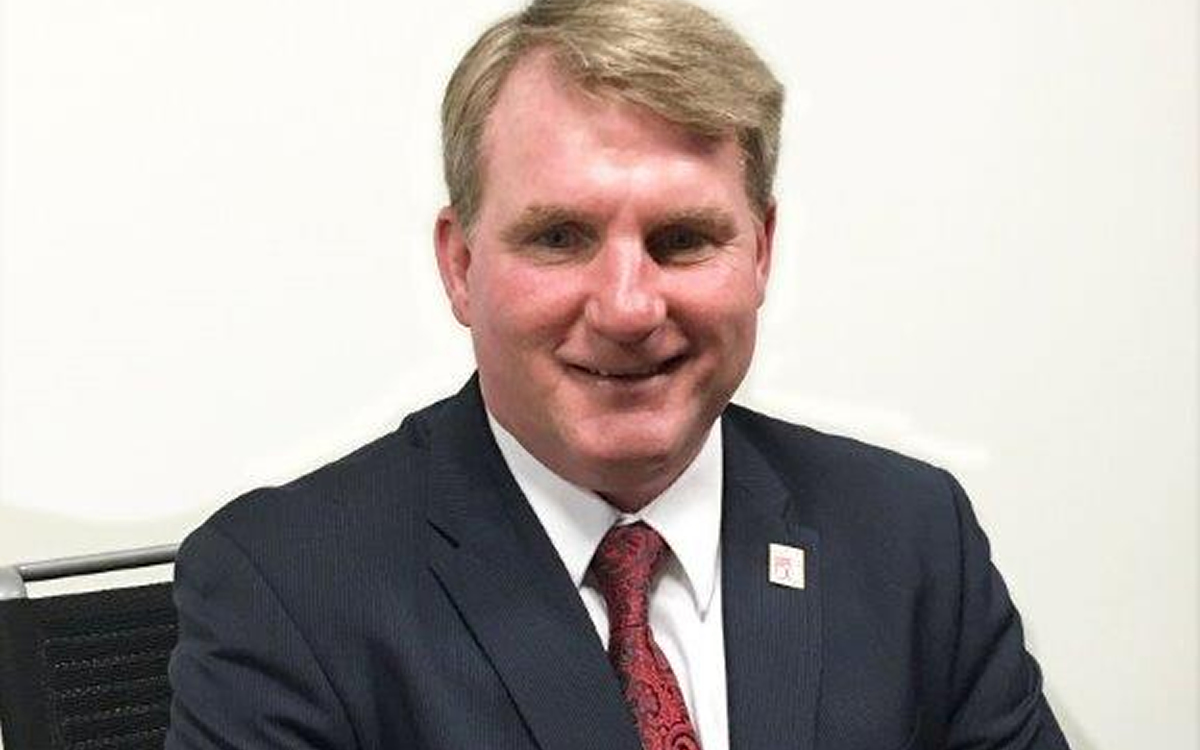
Three out of five known LGBTQ candidates running for election as delegates from D.C. to the Democratic National Convention won their races at an April 20 Democratic Party caucus election held at D.C.’s Walter Washington Convention Center.
Ward 2 gay Democratic activist John Fanning finished in first place with 140 votes and Ward 8 gay Democratic activist David Meadows finished in second place with 127 votes in a race in which six male candidates committed to supporting President Biden were competing for three male seats in a section of the city designated as Congressional District 1, which included registered Democratic voters in Wards 1, 2, 6, and 8.
Ward 7 gay Democratic activist Jimmie Williams won his race, finishing in third place with 200 votes in a race in which eight male candidates committed to President Biden competed for four male seats in the Congressional District 2 section of the city that included Wards 3, 4, 5, and 7.
Gay Democratic activist Felipe Afanador lost his race, finishing in sixth place with 47 votes in the Congressional District 2 election for male candidates backing Biden. It couldn’t immediately be determined which of the four wards in District 2 he is from.
The Washington Blade didn’t learn about Afanador’s status as an LGBTQ candidate until the Capital Stonewall Democrats announced it one day before the April 20 party election in an email statement.
In the Congressional District 2 race among female candidates, in which eight candidates competed for three female seats, transgender rights advocate and Ward 3 Democratic Party activist Monika Nemeth lost her race, finishing in sixth place with 49 votes.
The five LGBTQ candidates were among 32 candidates competing for just 13 elected delegate positions in D.C. D.C. will have a total of 51 delegates to the Democratic Convention, but the other 38 include elected officials and party leaders who are considered “automatic” or appointed delegates. The Democratic Convention will be held in Chicago Aug. 19-23.
Observers familiar with the April 20 party caucus election said Fanning, Meadows, and Williams had participated in local D.C. Democratic Party events and activities for a longer period than Nemeth and Afanador and appear to have been better known among Democratic voters in their respective wards as well as other wards. Those factors contributed to their receiving significantly more votes than most other candidates, observers have said.
In his candidacy statement posted on the D.C. Democratic Party website, Afanador said he worked on the 2020 Biden presidential election campaign in Pennsylvania. His LinkedIn page says in 2022 he began work in Washington for the Biden administration as an official in the U.S. Department of Agriculture.
Nemeth is a past president of D.C.’s Capital Stonewall Democrats, the city’s largest LGBTQ local political group, and has been an active member of the D.C. Democratic State Committee, the local party governing body. She served as a Biden delegate at the 2020 Democratic National Convention.
“It is important for our D.C. delegation to have strong LGBTQ representation,” Capital Stonewall Democrats said in its April 19 statement. “There are five LGBQ candidates running to be delegate, and Capital Stonewall Democrats asks that our members support each one,” the statement says.
“Unfortunately, they fell short, but they and all queer Democrats are welcome to attend and participate in convention events and activities sponsored by the national and local party,” Meadows told the Blade in referring to Nemeth and Afanador. “Our shared goal is to unite behind the Biden-Harris ticket to protect our LGBTQ rights from being dismantled by Donald Trump and the GOP,” Meadows said.
“Running for District Delegate is one of the most grassroots efforts,” Fanning told the Blade. “It’s very beneficial to align yourself on a slate with community leaders that have either previously run for District Delegate or have developed a constituency in their community from other civic engagements,” he said, referring to possible reasons for his, Meadows, and Williams’s election victory.
Aside from the D.C. elected LGBTQ delegates, two prominent D.C. LGBTQ Democratic leaders will be appointed as delegates to the 2024 Democratic National Convention in their role as members of the Democratic National Committee from D.C. They are Claire Lucas, a highly acclaimed Democratic Party and LGBTQ rights advocate and party fundraiser; and Earl Fowlkes, one of the lead organizers of D.C.’s annual Black LGBTQ Pride celebration and former president of the Capital Stonewall Democrats. Both are committed to supporting President Biden as the Democratic nominee for re-election.
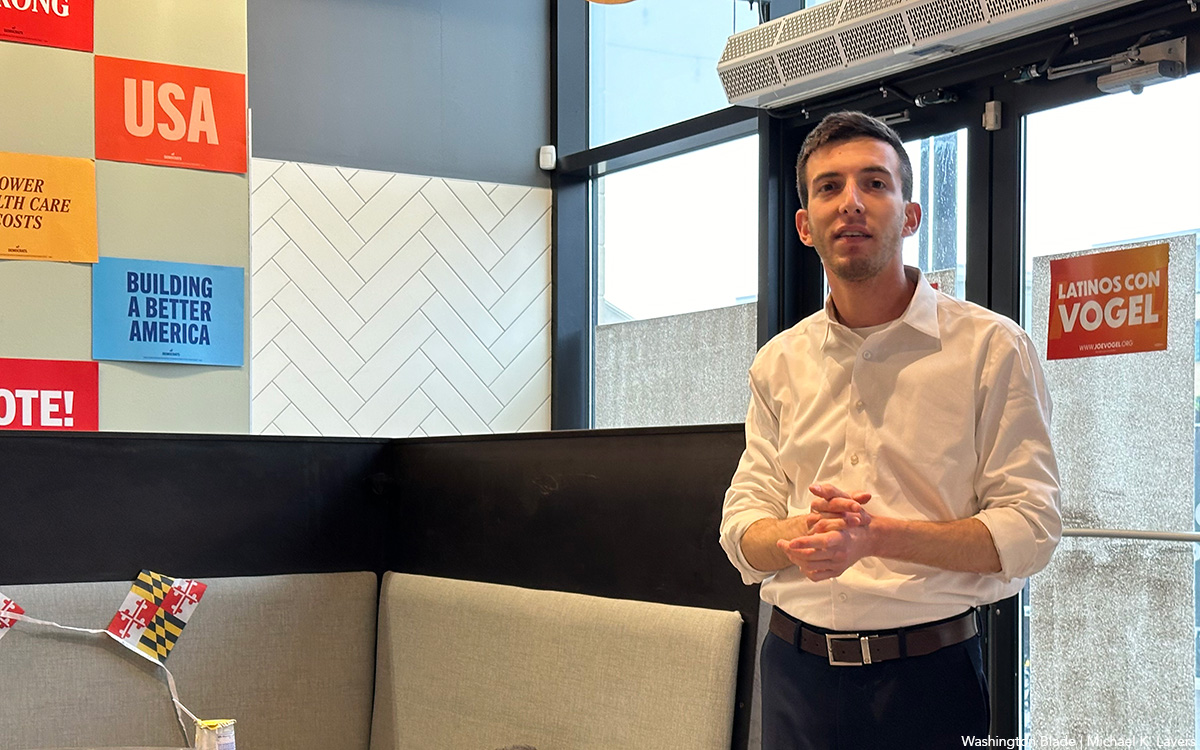
GAITHERSBURG, Md. — Maryland state Del. Joe Vogel (D-Montgomery County) on Friday held a “Big Gay Canvass Kickoff” event at his congressional campaign’s headquarters.
LGBTQ+ Victory Fund Vice President of Outreach and Engagement Marty Rouse and John Klenert, a member of the DC Vote and Victory Fund Campaign board of directors, are among those who participated alongside members of Equality PAC. Vogel spoke before Rouse, Klenert and others canvassed for votes in the area.
“Joe brings a fresh new perspective to politics,” said Gabri Kurtzer-Ellenbogen, deputy field director for Vogel’s campaign.
Vogel, 27, is among the Democrats running for Congressman David Trone’s seat.
Trone last May announced his bid to succeed retiring U.S. Sen. Ben Cardin (D-Md.) in the U.S. Senate.
The Democratic primary is on May 14. Vogel would be the first Latino, the first gay man and first Gen Zer elected to Congress from Maryland if he were to win in November.
“We need a new generation of leadership with new perspectives, new ideas, and the courage to actually deliver for our communities if we want things to get better in this country,” Vogel told the Washington Blade last month during an interview in D.C.
Maryland
Montgomery County police chief discusses arrest of trans student charged with planned school shooting
County executive tells news conference student’s trans identity is irrelevant to criminal charge
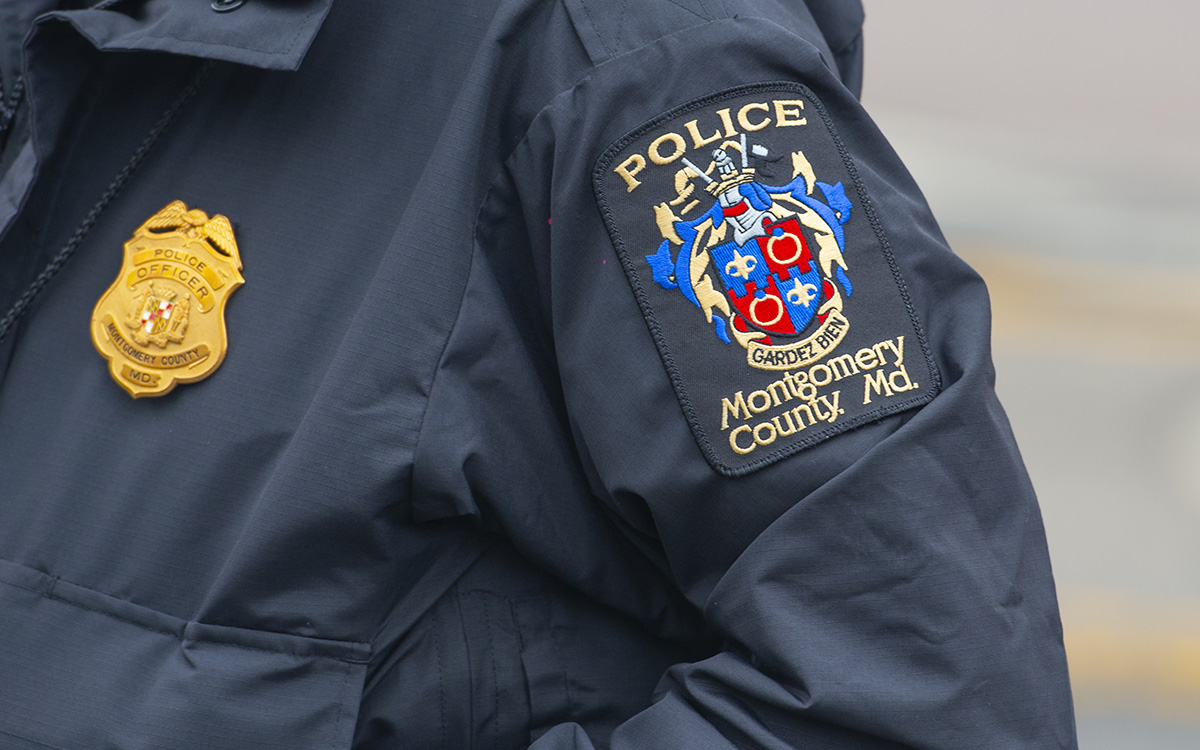
Montgomery County, Md., Police Chief Marcus Jones joined other county and law enforcement officials at a news conference on Friday, April 19, to provide details of the police investigation and arrest of an 18-year-old high school student charged two days earlier with threats of mass violence based on information that he allegedly planed a mass shooting at the high school and elementary school he attended in Rockville, Md.
In charging documents and in a press release issued on April 18, Montgomery County Police identified the arrested student as “Andrea Ye, of Rockville, whose preferred name is Alex Ye.”
One of the charging documents states that a friend of Ye, who police say came forward as a witness who played a crucial role in alerting authorities to Ye’s threats of a school shooting, noted that Ye told the witness that Ye identified as the transgender student he wrote about as a character in a 129-page manifesto outlining plans for a school shooting. Police have said Ye told them the manifesto was a fictional story he planned to publish.
At the news conference on Friday, Police Chief Jones and other law enforcement officials, including an FBI official and Montgomery County Executive Marc Elrich, referred to the student as Alex Ye and Mr. Ye. None of the officials raised the issue of whether Ye identified as a transgender man, seven though one of the police documents identifies Ye as a “biological female.”
County Executive Elrich appeared to express the views of the public officials at the news conference when one of the media reporters, during a question-and-answer period, asked Elrich why he and the others who spoke at the news conferment failed to “admit that this individual was transgender.”
“Because it’s not a lead,” Elrich replied, asking if the press and law enforcement authorities should disclose that someone arrested for murder is “a white Christian male who’s heterosexual.” Elrich stated, “No, you don’t – You never publish somebody’s sexual orientation when we talk about this. Why you are focusing on this being a transgender is beyond me. It’s not a news story. It is not a crime to be transgender.”
The reporter attempted to respond but was cut off by the press conference moderator, who called on someone else to ask the next question.
In his remarks at the press conference Chief Jones praised the so far unidentified witness who was the first to alert authorities about Ye’s manifesto appearing to make threats of a mass school shooting.
“Now, this is a situation that highlights the critical importance of vigilance and community involvement in preventing potential tragedies,” Jones said. “I commend the collaborative efforts of the Montgomery County Police Department, the Federal Bureau of Investigation, the Rockville City Police Department, and the Montgomery County Public Schools, as well as Montgomery County Health and Human Services,” he told the gathering.
“Thanks to their swift action and cooperation a potentially catastrophic event was prevented,” Jones said.
Jones pointed out that during the current school year, police have received reports of 140 threats to the public schools in Montgomery County. He said after a thorough investigation, none of them rose to the level where an arrest was made. Instead, police and school officials took steps to arrange for the student making the threats and their parents to take remedial action, including providing mental health services.
“But this case is different,” Jones said. “This case is entirely different that takes it to a different level. It was a concerned witness who brought this matter to light by rereporting the suspect’s manifesto to the authorities. This underscores the value of community engagement and the ‘see something say something’ approach,” he said.
Jones mentioned at the press conference that Ye was being held without bond since the time of his arrest but was scheduled to appear in court for a bond hearing on Friday shortly after the press conference took place to determine whether he should be released while awaiting trial or continue to be held.
In his manifesto obtained by police, Ye writes about committing a school shooting, and strategizes how to carry out the act. Ye also contemplates targeting an elementary school and says that he wants to be famous.
In charging documents reported on by WJLA 7 and WBAL 11, the 129-page document, which Ye has referred to as a book of fiction, included writings that said, in part:
“I want to shoot up a school. I’ve been preparing for months. The gun is an AR-15. This gun is going to change lives tomorrow … As I walk through the hallways, I cherry pick the classrooms that are the easiest targets. I need to figure out how to sneak the gun in. I have contemplated making bombs. The instructions to make them are surprisingly available online. I have also considered shooting up my former elementary school because little kids make easier targets. High school’s the best target; I’m the most familiar with the layout. I pace around my room like an evil mastermind. I’ve put so much effort into this. My ultimate goal would be to set the world record for the most amount of kills in a shooting. If I have time, I’ll try to decapitate my victims with a knife to turn the injuries into deaths.”
-

 District of Columbia5 days ago
District of Columbia5 days agoNew D.C. LGBTQ+ bar Crush set to open April 19
-

 District of Columbia5 days ago
District of Columbia5 days agoReenactment of first gay rights picket at White House draws interest of tourists
-

 Arizona5 days ago
Arizona5 days agoAriz. governor vetoes anti-transgender, Ten Commandments bill
-

 South America3 days ago
South America3 days agoDaniel Zamudio murderer’s parole request denied

